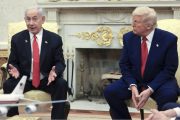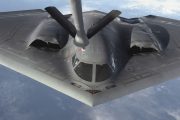
The Obama administration has completed its second flip-flop on his Syrian war policy in just over a month with the admission by Chairman of the Joint Chiefs of Staff Gen. Martin Dempsey in U.S. Senate hearings that Obama would approve ground troops in Iraq and Syria on a “case-by-case basis.”
Obama had stated in a September 10 nationally televised address that “we will not get dragged into another ground war in Iraq” and that his strategy “will not involve American combat troops fighting on foreign soil.”
Dempsey told the U.S. Senate Armed Services Committee September 16 that he believed Obama’s bombing campaign would “degrade” ISIS, but “if it fails to be true, and if there are threats to the United States, then I of course would go back to the president and make a recommendation that may include the use of U.S. military ground forces,” according to the New York Times.
President Obama is the fourth consecutive U.S. president to engage in a bombing campaign against Iraq, and among those four only President Clinton did not deploy combat ground troops to Iraq during his presidency. The United States has been bombing Iraq intermittently for 23 years since Operation Desert Shield in 1991 under the elder President Bush.
President Obama has also reversed policy on Syria with regard to shipping weapons to the self-styled Free Syrian Army rebelling against the Assad dictatorship. Obama stated as recently as August 8 in an interview with New York Times columnist Thomas Friedman:
With regard to Syria, it’s always been a fantasy. This idea that we could provide some light arms or even more sophisticated arms to what was essentially an opposition made up of former doctors, farmers, pharmacists and so forth, and that they were going to be able to battle not only a well-armed state but also a well-armed state backed by Russia, backed by Iran, a battle-hardened Hezbollah, that was never in the cards.
Just a month later, Obama had completely flip-flopped. He called for arming the same doctors, farmers, and pharmacists in a September 10 national address to the American people whose success he labeled a “fantasy” just a month earlier. “This is our strategy: And in each of these four parts of our strategy, America will be joined by a broad coalition of partners. Already, allies are flying planes with us over Iraq; sending arms and assistance to Iraqi security forces and the Syrian opposition; sharing intelligence; and providing billions of dollars in humanitarian aid.”
The warmongers over at the Weekly Standard grumbled that Obama still would not be sending enough ground troops. Commenting on Obama’s decision to send 3,000 soldiers to Africa to combat spread of the Ebola virus, Weekly Standard editor William Kristol noted that “it will be interesting to see if President Obama explains why unilaterally putting boots on the ground for the sake of killing our enemies is unthinkable in Iraq and Syria, but, in order to cope with a virus, fine in Liberia.”
Of course, if merely liberally shipping weapons were a solution to end terrorism and install freedom, Afghanistan — which has been receiving U.S. weapons shipments since 1980 — would be a paragon of stability after 34 years of such shipments. Many Americans have questioned the alliances of the Free Syrian Army, which include the al-Qaeda-linked Al Nusra. Indeed, unwise shipments of weapons to Afghanistan in the 1980s led to the rise of al-Qaeda and the Taliban.
Plus, there are the allegations (denied by the Obama administration) that the Free Syrian Army had sold American reporter Steven Sotloff to the ISIS terrorists who beheaded him.
Perhaps the most revealing statement uttered by Dempsey during the September 16 hearing was his admission that weapons shipments and bombing campaigns alone cannot bring peace or an end to terrorism. “Truly there is no military solution to ISIL,” General Dempsey told the senators. “That may be a tough pill to swallow. But there is no military solution.”
Photo: AP Images




